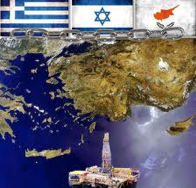Israel-Greece-Cyprus alliance aims to “promote a trilateral partnership in different fields of common interest and to work together towards promoting peace, stability, security and prosperity in the Mediterranean and the wider region.” (Cyprus – Israel – Greece Trilateral Summit Declaration )
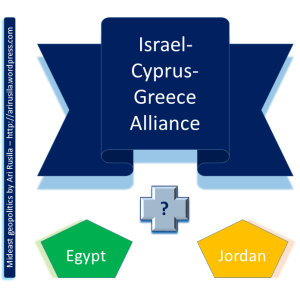
Publicly all three countries say that this alliance is not against any other country, meaning specifically Turkey. However the reality probably is the opposite. Of these countries, Israel is the only major military power. Both Greece and Cyprus have major economic problems, and although members of the EU, are not in any significant way protected by their EU-NATO alliance. Although EU and US are very concerned about the fake “occupation” by Israel of the Palestinians , the northern third of Cyprus is still occupied by Turkey after 30 years, and the EU and US are doing nothing about this.
The context of latest geopolitical developments in Mideast is based to dramatic events in 2015 which have brought into focus following aspects turning the Eastern Mediterranean into one of the key areas for global security:
- The refugee crisis due to chaotic conditions in Syria, Libya and beyond;
- The growing hold, upon Mediterranean shores, of totalitarian Islamism in its various forms – Iran’s camp; Daesh aka Islamic State; and the Muslim Brotherhood (with Turkey and Qatar as allies).
- The prospects for cooperation in the field of energy.
- Russia replacing US as key outside player (related to Israel sure there is influential Jewish diaspora in US but same time there is one million immigrants from ex-USSR living in Israel)
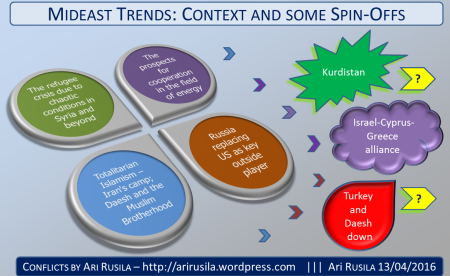
EastMed Bloc
The improvement in relations between Greece and Israel started in 2010 with socialist Prime Minister George Papandreou, continued in 2012 with conservative Prime Minister Antonis Samaras, and is being followed today by the leftist Tsipras. The Greek-Israeli relationship, which has flourished under a remarkable variety of political regimes, also enjoys broad support among the Greek public. Israel has a strong defense and military relationship with Cyprus as well that started (surprisingly) during the tenure of Communist President Demetris Christofias, and that continues at full speed under current conservative leader Nicos Anastasiades.
From an Israeli perspective, the recent strengthening of alliance ties with Greece and Cyprus constitutes a win-win situation. A new geopolitical bloc is emerging that has military and political significance, and stands as a counterweight to Turkish ambitions. The past months have been characterized by an unprecedented and noteworthy flurry of diplomatic activity between Jerusalem, Athens and Nicosia that suggests the emergence of a new geopolitical bloc in the region.
In late January, the Israeli Minister of Defense Moshe Ya’alon paid an official visit to Athens, hosted by his Greek counterpart, Panos Kammenos. (This was the second official visit of an Israeli Minister of Defense to Greece. In late 2012, Ehud Barak visited Athens.) Ya’alon’s visit to Greece serves to illustrate the intensive security and military relationship between Israel and Greece that began several years ago. This involves frequent joint air force exercises (with other countries occasionally participating), as well as joint maneuvers of the two navies. Israeli military planes have been forbidden from flying over Turkey ever since the 2010 Mavi Marmara incident, so they use Greek airspace on their flights to Europe and the United States instead. An Israeli military attaché has been stationed in Athens since the summer of 2014, and he is also accredited to Cyprus. Strikingly, Ya’alon did not hesitate while in Athens to publicly accuse Turkey of supporting terror rather than fighting it, specifically alleging that Turkey buys oil from ISIS.
Also in late January, a government-to-government conference was held in Jerusalem between the cabinet of Israeli Prime Minister Benjamin Netanyahu and the Greek government of Prime Minister Alexis Tsipras. Tsipras arrived with a large delegation of ten ministers. This was the second government-to-government meeting of the two countries (the first was held in October 2013 with conservative Prime Minister Antonis Samaras), and the second visit of Tsipras to Israel within two months. . (One should note, that Greece is only the second country other than the US with which Israel has signed a ‘status of forces agreement’.)

(Source and more: A New Geopolitical Bloc is Born in the Eastern Mediterranean: Israel, Greece and Cyprus by Ambassador Arye Mekel, a senior research associate at the Begin-Sadat Center for Strategic Studies, also as PDF )
EastMed Pipeline
The core of this new alliance is the EastMed Pipeline project from Israel and Cyprus via Greece that would export the Eastern Mediterranean gas to the European market. Israel now has very major finds of natural gas in the Mediterranean off Haifa, and Cyprus has some wells too nearby. Israel is far better positioned to exploit these finds and Cyprus is being helped by Israel in developing their finds. Also, such wells need security from attack and Israel has established a military command purely for this. Greece in its dire economic situation, also with the addition of tens of thousands of Muslim migrants invading the country, needs help. Israel is prepared to supply natural gas to Greece at discounted prices. This is good for both countries. Other countries might later be included in this alliance (possibly Egypt, Jordan, Italy and Bulgaria).
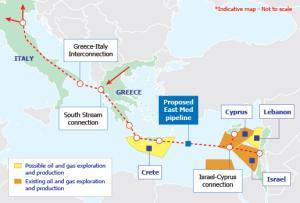
Related to hydrocarbons, Israel and Russia are about to agree cooperation in the East Mediterranean. Israel would agree to end talks with Turkey’s erratic Erdogan on sale of Israeli Leviathan natural gas to Turkey to displace Russian Gazprom gas which still supplies 60% of Turkish gas despite sanctions. According to unnamed diplomatic sources, Putin envisions an investment between $7 billion to $10 billion to develop Israeli offshore gas fields. In addition the Israeli military establishment “prefers maintaining military cooperation with Russia over potential Israeli gas sales to Turkey if they hurt Russian interests and anger Putin.” (Some background in Realpolitik: The Energy Triangle As Game Changer For The Eastern Mediterranean )
Turkey down Kurdistan up
Ankara has been at a standoff with Moscow in recent months, ever since Turkey shot down a Russian fighter jet on the Syrian border last November, and Russia responded with crippling sanctions and Turkey began normalization talks with Israel. These talks were largely motivated by Turkey’s desire to buy gas from Israel. However the Turkish authorities have yet to close the Hamas terror headquarters in Istanbul, and according to reports the country continues to purchase oil from Islamic State (ISIS) despite global criticism. In light of these reasons, as well as anti-Israeli and anti-Semitic comments by senior Turkish officials, the sources estimate that the negotiations are destined to fail. (Source Arutz Sheva )
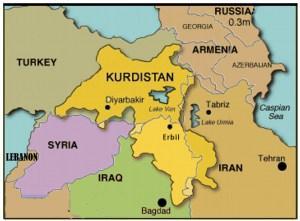
Israel, on its part, was the first state to declare its support for an ‘independent’ Kurdistan. In 2014, Netanyahu said: “We should … support the Kurdish aspiration for independence. Kurds are a nation of fighters [who] have proved political commitment and are worthy of independence.” This January, Israel’s Justice Minister Ayelet Shaked called for an independent Kurdistan between Iran and Turkey, and an enhanced policy of cooperation between Israelis and the Kurds. When Iraqi Kurds defied Baghdad in 2015 and began direct sale of the oil in their region, Israel became the major buyer. The oil revenues allowed the Iraqi Kurds to finance their fight against Islamic State (ISIS). A Financial Times report estimated that Israel had purchased 19 million barrels of Iraqi Kurdish oil worth roughly $1 billion between May and August last year [2015].
Turkey has been opposing the establishment of an ‘independent’ Kurdish state, has been supporting Hamas which, in turn, aims at ‘destroying’ Israel and has also at least indirectly assisted Daesh. These actions have instrumental in bringing Israel and Russia closer. Despite Turkey’s attempts at normalizing its relations with Israel, Jerusalem continues to prefer Russia.
The declaration of an autonomous Kurdish-dominated territory along the Turkish border backed by Moscow is a major geopolitical shift in the Syrian situation. On March 17 delegates representing different ethnicities and nationalities–Kurds, Arabs, Assyrians, Syriacs, Turkomans, Armenians, Circassians and Chechen–along with representatives from the Syrian People’s Defense Units or YPG, and the YPJ womens’ defense units declared a formal Federation of Northern Syria which would incorporate 250 miles of mostly Kurdish-held territory along the Syria-Turkey border. On February 7 of this year a curious event took place little noticed by western media. The Syrian Kurds, represented by the Democratic Unity Party (PYD), the main political organization, were welcomed by Russia to open their first foreign office in Moscow.
Russia replaced US
On 15th March 2016, Israeli President Reuven Rivlin visited Moscow to hold talks with President Vladimir Putin on Syria and the circumstances that led to Russian pull-out. According to Israeli media, the two leaders also discussed continued military coordination between Jerusalem and Moscow in Syria. Rivlin later held talks with Prime Minister Medvedevin in which Russian government sought more imports of agriculture products from Israel to replace Turkish products blocked following sanctions on Ankara. An Israeli official told local media that “over the last few months, we had regular contact with the Russians at the highest level, and that will continue.”
Israel, for its part, risked a diplomatic crisis with Australia last month by abruptly canceling an official visit by President Reuven Rivlin, who instead headed to Moscow for an urgent meeting with Putin. And this occurred just after Prime Minister Binyamin Netanyahu canceled a planned meeting with Obama in Washington, without even bothering to communicate that officially to the White House. Russia’s smart use of hard power to achieve specific, achievable objectives in Syria has made Russia a focal point for the major actors in the Middle East – creating a serious geopolitical challenge for the US.
Several weeks ago, Putin said he plans to meet with Netanyahu in the nearest future, noting that Russia and Israel have “many issues” to discuss. Israeli media reported that Netanyahu plans to travel to Moscow later in the month, allegedly on April 21, to meet with Putin. (Source e.g: Asia Times )
Totalitarian Islamism – Iran’s camp; Daesh and the Muslim Brotherhood
The problems facing the Mediterranean security architecture are more acute than ever not only because of the chaotic conditions and criminal conspiracies discussed above, but also due totalitarian Islamism. In general, they can be categorized as belonging to three variants on the theme of Islamism, bitterly hostile to each other: Iran’s camp; Daesh (ISIS) and the Muslim Brotherhood with two influential allies, Turkey and Qatar. These can be described as enemies to many post-modern European, acting brutally and in open defiance of the laws of war and the most elementary norms of human conduct. These forces are by now gaining ground on Mediterranean shores.
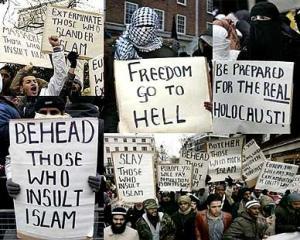
The relations between Egypt and Hamas are one core question in (partial) Israeli-Palestinian peace process. Besides planned Hamas-Israel ceasefire deal Egypt has a decisive role if sc ‘Sinai option’ (more in Sinai Option again ) will go further as partial solution to conflict. Also even without these kind progress Egypt’s actions with Rafah crossing have great importance for welfare of Gaza population. (More in Gaza Blockade – It’s Egypt not Israel! ) Egypt has officially accused Hamas of training the terror operatives who assassinated Egyptian Prosecutor General Hisham Barakat last year. Egyptian authorities say Hamas is also actively assisting Wilayat Sinai, the Daesh’ (Islamic State movement’s) branch in northern Sinai, and that this aid involves training its operatives in Gaza and treating its wounded fighters in Gaza hospitals.
(Source and background analysis: The BESA (Begin-Sadat) Center at Bar Ilan University has issued a report written by Col. Dr. Eran Lerman on the Eastern Mediterranean and Israel’s role in the development of a new strategic alliance, also as PDF ).
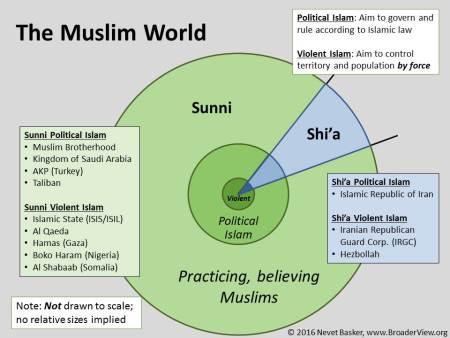
Conclusion
According New Eastern Outlook the fast approaching prospects of an economically stronger Iran seem to have pushed the Israeli policy makers to strike an ‘energy deal’ with Greece and Cyprus—a deal that is supposed to have strong economic as well as politico-strategic underpinnings at various levels of polity. Israel’s agreement with Greece and Cyprus regarding the development of the vast hydrocarbon reserves that have been discovered in the Eastern Mediterranean, the January 28 declaration has some special significance.
In principle, EastMed Pipeline could also help connect Syria and the Kurdish regions with the European market. To be sure, the EastMed Pipeline project is getting a head start over any definite plans by Iran yet to access Europe’s gas market.
From an Israeli perspective, the recent developments with Greece and Cyprus constitute a win-win situation. The strengthening of ties with these countries creates a new geopolitical bloc that could, to some extent, stand up to Turkey. This bloc has both military and political significance. Greece is ready right now to assist Israel within the European Union, as it proved recently when it led the opposition to labeling settlement products. This represents a sharp change in Greek policy within the European Union. Cyprus almost automatically supports the Greek position, which gives the Greeks a double vote within EU institutions.
Turkey from its side is sliding to isolation and losing ground as regional superpower while Russia is back at the center of the Middle East geostrategic game. As the Americans created a vacuum in their withdrawal Russia replaced it fast. Related to Syria one possible option, which Russia has championed, would be a federal system: Assad’s Alawites could control territory in the West, running from Latakia in the north to Damascus in the south, and an autonomous Syrian-Kurdish region could be established in the northeast, with the rest of the country being left to the Sunni opposition.
